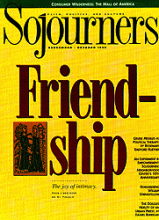We moved on the hottest day of August 1983. While all sensible people in Columbia Heights were sitting in front of their fans and sipping cold drinks, 31 people were spending the day on the 1300 block of Girard Street NW, hauling old desks, file cabinets, refrigerators, and shelving units into our newly renovated building.
A human chain stretched from the moving van in the street to the third floor of the building. Boxes of office supplies, paper, and anything else weighing less than 25 pounds were passed into the building and deposited into the appropriate room. At the end of the day we were soaked with sweat and the still incomplete building was so full of boxes that we could hardly walk through it.
But as we surveyed the scene we were delighted finally to be home. Sojourners Neighborhood Center had become a reality.
To understand our delight on that hot August day, it is important to know the events leading up to it. From the inception of Sojourners Community, we have felt God's call in our life deeply rooted in walking with marginalized and oppressed people--not as solution bearers, but as fellow travelers. The now famous quote of Lilla Watson, an Australian aborigine, sums up our calling well: "If you have come to help me, you are wasting your time. But if you have come because your liberation is bound up with mine, then let us walk together."
When we moved to the inner city of Washington, D.C., in August 1975, we began the journey with our neighbors. During our first eight years here, we met with them in homes, in the rented space of housing complexes, and in the basement of a condemned building. Together with our neighbors, we had a vision of a place that would be more permanent--a place we could call home.
Read the Full Article

